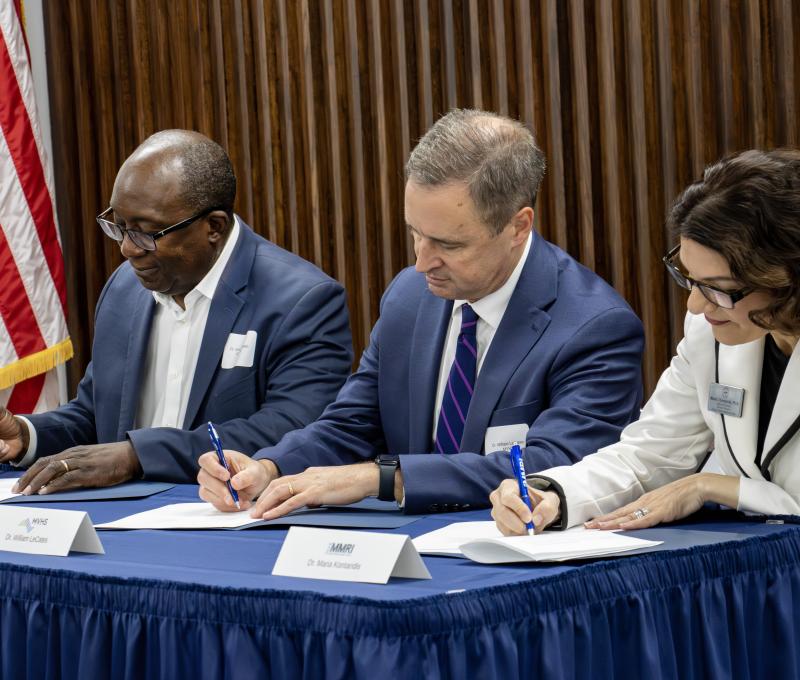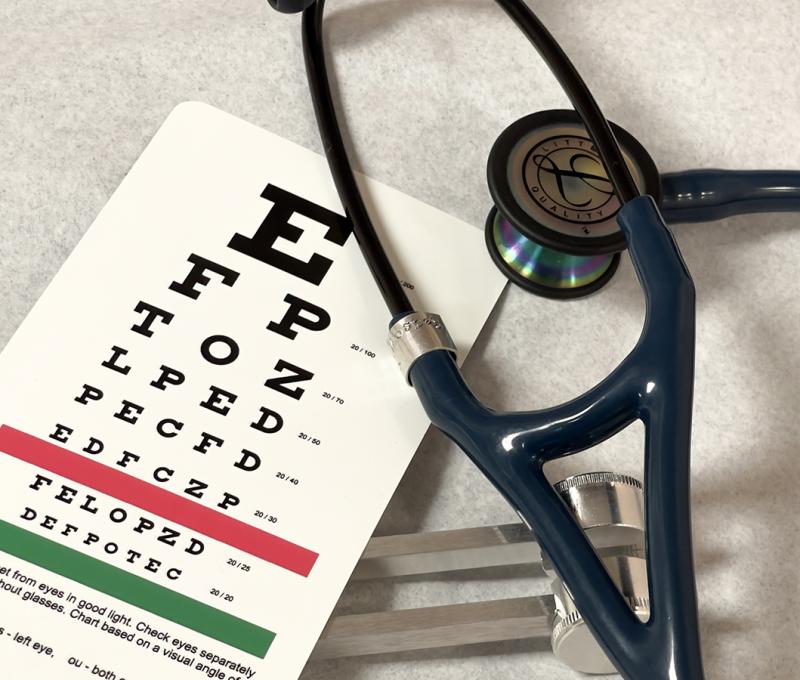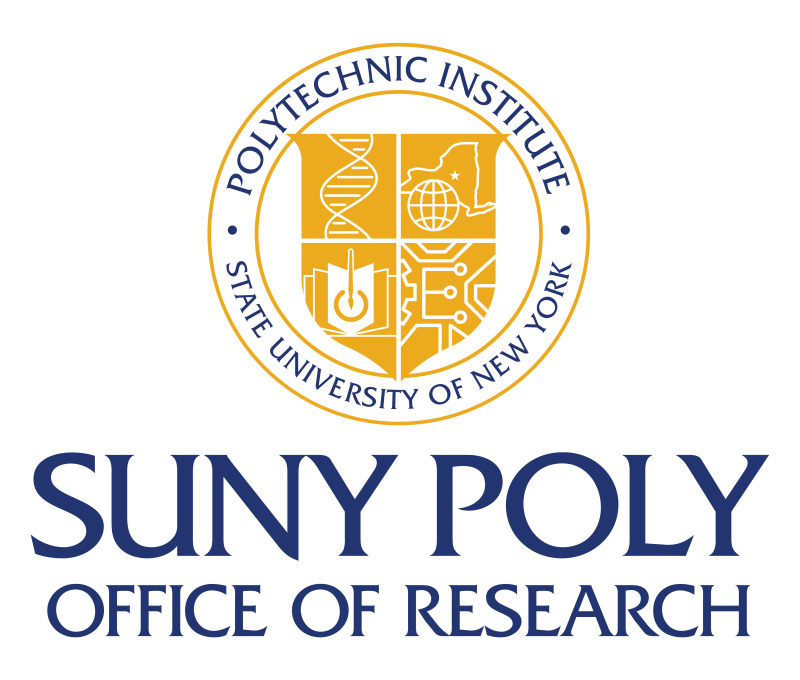SUNY Poly Professor Receives $890,000 as part of a Multi-Institution Consortium Grant from the National Institutes of Health for Innovative Breast Cancer Research

Collaborative research to leverage SUNY Poly’s state-of-the-art nanobioscience capabilities to better understand how breast cancer cells spread, potentially leading to more effective treatment
ALBANY, NY – SUNY Polytechnic Institute (SUNY Poly) announced today that a multi-institution consortium, headed by research groups at SUNY Poly and Albert Einstein College of Medicine, has been has been awarded a five-year, $2.9 million grant by the National Institutes of Health (NIH) National Cancer Institute (NCI). The principal investigators on the grant—John Condeelis (Einstein), David Entenberg (Einstein), and Jim Castracane (SUNY Poly)—will lead a research program to utilize imaging technologies in an effort to identify, quantify, and locate the cells that contribute to tumor progression, metastasis, and chemotherapy resistance.
“I congratulate Professor Castracane for this important NIH grant that paves the way for a better understanding of breast cancer and how we can more efficiently treat this disease that affects far too many people,” said SUNY Poly Interim President Dr. Bahgat Sammakia. “SUNY Poly’s nanobioscience-focused research is leading the way toward solutions that can improve so many people’s lives, and in partnership with these other well respected institutions, I am thrilled to see progress being made right here, with valuable opportunities for graduate students to gain a hands-on, health-focused education.”
SUNY Poly Professor and Head of the Nanobioscience Constellation, Dr. Jim Castracane will lead SUNY Poly’s research, funded by $890,000 from the grant, that continues SUNY Poly’s established partnership with the Einstein, Mount Sinai Medical Center, and the University of Wisconsin—Madison. The funding will also support unique educational opportunities for a number of SUNY Poly graduate students and leverage SUNY Poly’s world-class 200 mm cleanroom facilities.
“I am honored that the National Institute of Cancer has decided to support this significant research in which SUNY Poly plays a key role, providing the know-how and advanced microdevice fabrication capabilities which enable a one-of-a-kind, collaborative approach to more fully learn the triggers for breast cancer cell metastasis,” said Dr. Castracane. “Supporting SUNY Poly faculty and students, this grant is allowing us to build upon ten years of research with our partners in this area of cancer research, and it offers a number of SUNY Poly’s graduate students the chance to be on the front lines of cancer research using some of the most innovative tools available.”
“Combining the imaging and microfluidics technologies developed at the collaborating institutions of this grant allows, for the first time, the direct observation of cause and effect relationships between cells in TMEM that are responsible for tumor metastasis and their responses to treatment,” says Dr. Condeelis.
By merging our institutions’ unique technological strengths, this grant allows us to carry out, in cancer cells’ natural environment, the types of studies that were previously possible only in petri dishes,” says David Entenberg, Director of Technological Development within the Biophotonics Center. “This is the most clinically relevant way to study cancer and will allow us to answer questions that just couldn’t be addressed before.”
More specifically, SUNY Poly’s research focus will be to develop single/multiple reservoir, implantable Microfluidic Imaging Windows (MFIW) that can be combined with unique imaging technologies developed at Einstein’s Gruss Lipper Biophotonics Center. The MFIW will be mounted over the tumor samples and enable the release of specific chemoattractants and multiple fluorescent antibodies using noncontact mechanisms such as light-activated micro-valves and light-driven microfluidic pumps. This work will be in support of the overall effort to label and collect cancer cells, all while obtaining images through the windows of the results in live tumors at single cell resolution and in real time.
Each additional partnering institution will contribute a unique technological development to the study. For example, Mount Sinai will contribute biosensors for tumor cell dormancy that can visually determine which cells are actively dividing, and hence susceptible to the effects of chemotherapy, and which cells are not; and UW-Madison will contribute imaging technologies that can directly visualize the metabolic state of cells.
“Dr. Castracane’s innovative research is paving the way for new, more accurate approaches to better understand how breast cancer cells behave, and as the NIH recognizes, this could provide a potential pathway to learn new ways to stop its deadly spread,” said SUNY Poly Provost Dr. William Durgin. “We are excited that this award will not only empower research with importance for many cancer patients around the world, but also enable opportunities for a number of our graduate students to gain a greater knowledge of the scientific concepts and nano-inspired methods that could one day help stop the spread of breast cancer.”
“I warmly salute Dr. Castracane for his innovative, collaborative research that is focused on creating a more accurate understanding of what makes breast cancer cells so deadly, and I am thrilled that SUNY Poly’s advanced facilities can power this impactful research,” said SUNY Poly Interim Dean of the College of Nanoscale Science Dr. Alain Diebold. “In addition to utilizing SUNY Poly’s next-generation capabilities and unique knowledge base, this NIH grant is also providing graduate students with the kind of first-hand experience that SUNY Poly is widely recognized for. This research could lead to a bright future where the nanobioscience-centered investigations of today could lead to critical health solutions in the not-too-distant future.”
Overall, the research under the NIH grant will support two graduate students’ research at SUNY Poly, as well as a number of other students at the institution’s partnering organizations, in addition to making use of SUNY Poly’s advanced resources. Relying on SUNY Poly’s 200 mm wafer cleanroom capability, the advanced semiconductor-based tools are expected to fabricate the microdevices; the institution’s leading-edge confocal microscope is being used for imaging, and Dr. Castracane’s team will be able to monitor progress of the cell dynamics as well as the microdevice’s release of selected biomolecules. Additionally, this work is complementary to previously announced research being done with an Israeli company, SpacePharma, in which cell studies are being translated to simulate microgravity in SUNY Poly’s nanobioscience labs, with the potential to send the experiment to the International Space Station to gain a greater understanding of the impact of microgravity on cancer cell behavior.
####################
SUNY Polytechnic Institute. SUNY Polytechnic Institute (SUNY Poly) is New York’s globally recognized, high-tech educational ecosystem, formed from the merger of the SUNY College of Nanoscale Science and Engineering and SUNY Institute of Technology. SUNY Poly offers undergraduate and graduate degrees in the emerging disciplines of nanoscience and nanoengineering, as well as cutting-edge nanobioscience and nanoeconomics programs at its Albany location and undergraduate and graduate degrees in technology, including engineering, cybersecurity, computer science, and the engineering technologies; professional studies, including business, communication, and nursing; and arts and sciences, including natural sciences, mathematics, humanities, and social sciences at its Utica/Rome location. Thriving athletic, recreational, and cultural programs, events, and activities complement the campus experience. As the world’s most advanced, university-driven research enterprise, SUNY Poly boasts billions of dollars in high-tech investments and over 300 corporate partners. For information visit www.sunycnse.com and www.sunypoly.edu.
####
Media Contact:
Steve Ference, Director of University Communications
(518) 956-7319 | sference@sunypoly.edu








